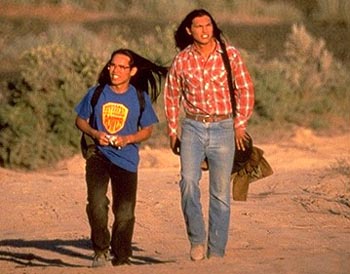Indian Runners
On the Road Again: Victor Joseph (left, Adam Beach) and Thomas Builds-the-Fire (Evan Adams) journey to Phoenix in 'Smoke Signals.'
Traveling the West with a Native American nerd and his bitter friend
THAT Smoke Signals is being billed as the first film produced, directed, written and acted by Native Americans is probably misleading; somewhere, there must be a 16mm or 8mm film made earlier, and it's best to consider Smoke Signals on its own merits, rather than as a breakthrough possible only in our enlightened times. I doubt if many people can be moved by that feeling that says, "If I buy a ticket to this movie, it will remove some of the weight of history from my mind." Fortunately, Smoke Signals is a flexible, bright work by a young director. It possesses only a little of the archness and smugness of, say, Follow Me Home, and it pulses with the kineticism that a road movie ought to have--you can watch the scenery and watch the changes caused by the journey.
Based on The Lone Ranger and Tonto Fistfight in Heaven, screenwriter Sherman Alexie's short-story collection, Smoke Signals is the tale of two young men on the Coeur d'Alene reservation in Idaho. Victor Joseph (Adam Beach), abandoned by his father when he was a child, has just received news of the old man's death and is going to Arizona by Greyhound to pick up his possessions. Forcing himself along as company is the likable but socially inept Thomas Builds-the-Fire (a hayseed's hayseed played by Evan Adams), a close friend of the family. In flashback, they remember their respective relationships with surly Joseph's hard-drinking, sometimes abusive father. When they arrive, the old man's last companion, a nurse named Suzy Song (Irene Bedard), fills in the last pieces of the story of why Victor's father left his home.
Director Chris Eyre seamlessly integrates the flashbacks with the present-tense story and captures rarely seen images of a small-town West full of impermanent-looking houses and churches and double-wide trailers. Eyre also uses Robert Altman's trick in MASH of sketching out a community with snippets from radio broadcasts. KREZ radio gives us a quick guide to the setting of Smoke Signals with a wake-up show, including traffic report ("A big truck just went by") and the DJ's audience-fluffing ("It's a great day to be indigenous"). The massive Gary Farmer beautifully handles the tricky part of a warm father who is also a drunken bruiser.
Adams sometimes overdoes the poetry of his character; he utters little monologues that occasionally induce cringes. Still, he's enjoyable as a Native American nerd, with glasses, a cheap suit and, to use Russ Meyer's phrase, "teeth like a Victorian mule." More than just comic relief, Adams' Thomas delivers a very touching closing monologue (a poem by Dick Lourie). Oddly enough, the pure sentiment of Smoke Signals works better than the discursive last third--or the moments in which Thomas and Victor do some heavy-handed joking about John Wayne the Injun killer. (This is an especially sore point, because many Native Americans live in the West, the last part of the country where there still is a John Wayne cult.) Mostly, Smoke Signals presents a tender look at reservation life; there seems to be so much going on underneath the surface lassitude that I hope Eyre's next film will just stay there and show us the people.
[ San Jose | Metroactive Central | Archives ]
![]()

Jill Sabella
Smoke Signals (PG-13; 89 minutes), directed by Chris Eyre, written by Sherman Alexie, photographed by Brian Capener and starring Adam Beach, Evan Adams and Irene Bedard.
From the July 2-8, 1998 issue of Metro.
![[Metroactive Movies]](/movies/gifs/movies468.gif)